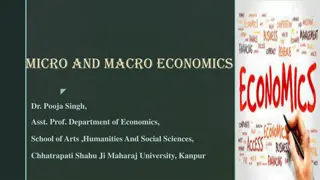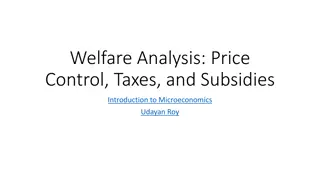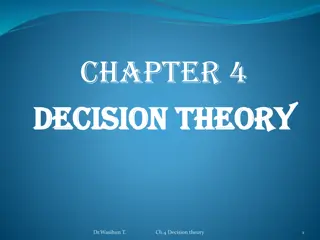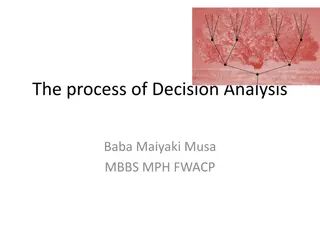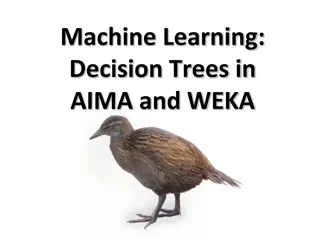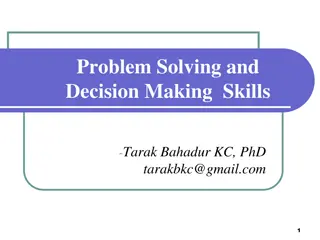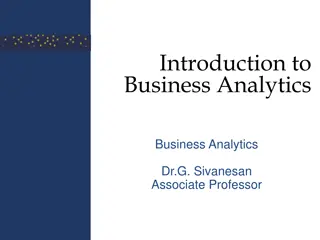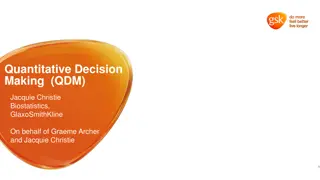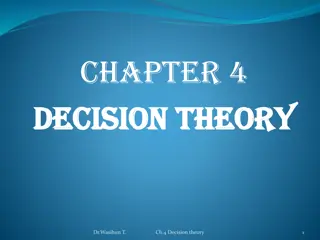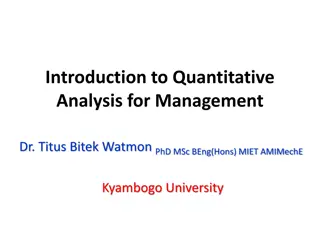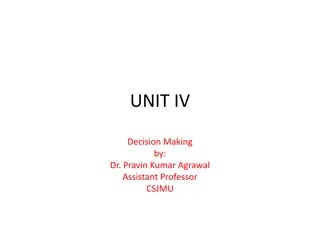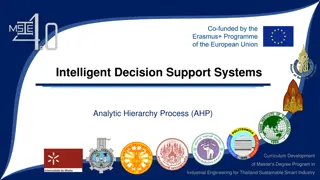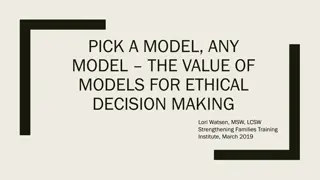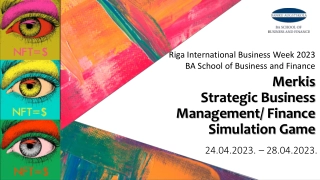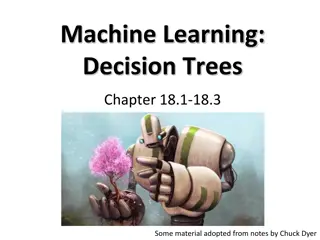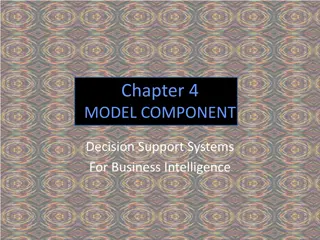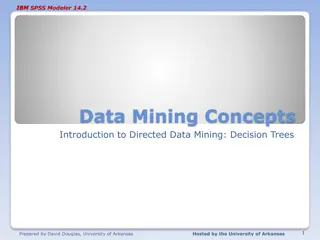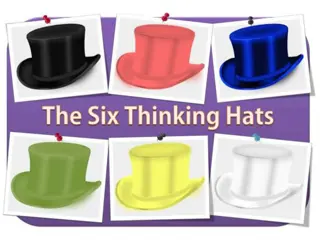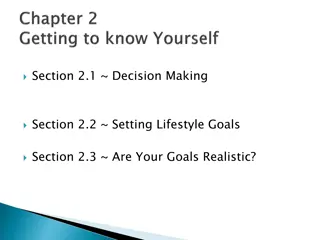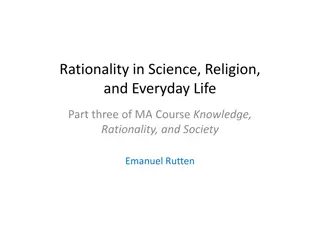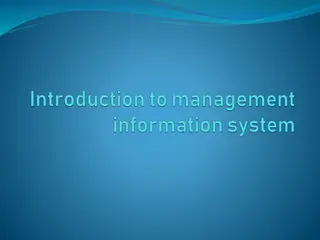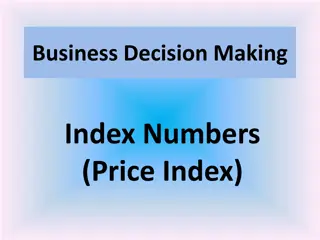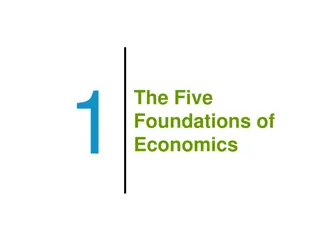Understanding the Importance of Microeconomics in Business Decision Making
Microeconomics focuses on the economic actions of individual units and small groups in the economy. It delves into decision-making processes, relationships with economic variables, market equilibrium, elasticity of demand and supply, consumer behavior, production theories, pricing practices, and welfare economics. The scope covers the theory of demand, production and cost, product pricing, factor pricing, and economics welfare. Ultimately, microeconomics plays a crucial role in understanding how economies function, aiding in policy formulation, resource allocation, problem-solving, business decisions, international trade comprehension, and behavioral studies.
Download Presentation

Please find below an Image/Link to download the presentation.
The content on the website is provided AS IS for your information and personal use only. It may not be sold, licensed, or shared on other websites without obtaining consent from the author. Download presentation by click this link. If you encounter any issues during the download, it is possible that the publisher has removed the file from their server.
E N D
Presentation Transcript
Unit : One { INTRODUCTION} Meaning of Microeconomics: Microeconomics studies the economic action and individual units & small groups individual units. It also studies about decision making of individual economic units and their relationship with economic variables. In microeconomics, we make a microscopic study of the economy.
Microeconomics For Business 1} Introduction 2} Market Equilibrium & Efficiency 3} Elasticity of Demand and Supply 4} Analysis of Consumer s Behavior 5} Theory of Production 6} Cost & Revenue Curves 7} Product pricing theories & practices 8} Theory of Factor Pricing
Scope of Microeconomics 1) Theory of demand 2) Theory of Production and cost 3) Theory of Product pricing 4) Theory of Factor pricing 5) Theory of Economics welfare
1) Goods and services are produced due to the consumers demand. Theory of demand refers to the analysis of consumer s demand for a commodity and his or her maximum satisfaction. 2) One of the most important branch of microeconomics is theory of production and cost. Under the theory of production , we study production function, laws of returns to scale. 3) Microeconomics also deals with theory product pricing. Under the theory of product pricing , we study determination of price of goods and services under various market conditions like perfect competition, monopoly and monopolistic competition.
4) Theory of factor pricing deals with determination of reward of factors of production. There are four factors of production: land , labour , capital & organization. These factors production get reward in the form of rent, wages, interest and profit respectively. 5) Microeconomics also deals with welfare economics. The subject matter of welfare economics includes efficiency in consumption , production and distribution . This helps to improve the economic condition of people.
Importance of Microeconomics 1 Helpful to understand working of the economy 2 Formulation of economic policy 3 Helpful in efficient allocation of resources 4 Solution of economic problems 5 Helpful in business decisions making 6 Useful to understand international trade 7 Helpful in the study of human behaviours
1 Microeconomics is very useful to study how an economy functions. It tells us how millions of consumers and producers make decision about the allocation of resources among goods and services. 2 Microeconomics tools are useful in designing price policy, taxation policy, investment policy etc. It helps to formulate sectoral policies such as tourism , trade, industry and others.
Limitations of Microeconomics 1) Static : In the study of microeconomics , static analysis is used. In its analysis only one variable is assumed to be variable are assumed to be constant. In the real life , all variable are changing unrealistic. 2) Assumptions : Microeconomics is based on the assumptions of full employment and perfect completion in the economy. But in the real world , both these condition are not found. Therefore , the assumptions of microeconomics are wrong.
3} Wrong conclusion = Most of conclusion drawn from the study of microeconomics are wrong . The conclusion derived from microeconomics may not be applicable to whole economy . For example , saving of an individual is good for him but if all individual of the country begin to save. It will be harmful to the economy. 4 } Limited scope = Microeconomics has limited scope. It does not study the many problems like poverty , unemployment , inflation etc.
Concept of Business Economics Business economics is a field in applied economics which uses economics theory, principles , tools and techniques in business economics. Business economics is defined as the branch of economics which deals with application of economic principles and methods for business & managerial decision of firms. According to Joel Dean The purpose of business economics is to show how economic analysis can be used in formulating business policies.
Nature or Features of Business Economics 1] Microeconomics character: Business economics is microeconomics in character. It studies problems of business firm. It does not study about economy as a whole. 2] Realistic one : Business economics is realistic science. It studies all maters concerning business organization by considering the real condition existing in the business field.
3]Pragmatic Business economics is more pragmatic than traditional economics. Therefore , it is also called applied microeconomics. It avoids difficult issues of economics theory. It tries to solve the managerial problems that appear in their day to day functioning. 4] Use of theory of the firm Business economics uses that economic concepts and principles which are know as the theory of firm. Thus , the scope of business economics is narrower than the scope of pure economic theory. 5] Helpful in managerial decision making Business economics integrates the theories of traditional economics and the business practices. The main aim of business economics is to help the management in making correct decision and preparing plan & policies for future.
Scope of Business Economics 1] Demand Analysis & Forecasting 2] Cost & production Analysis 3] Price Decisions & Policies and Practices 4] Profit Management 5] Capital Management
Production Possibility Curve Production possibility refers to the alternative combinations of goods & services that an economy can produce with all available resources at a given time. According to P.A Samuelson The PPC depicts society s menu of choice. Assumptions: 1) Only two goods 2) productive resources are fixed & limited 3) The state of technology remains constant
Ten Principles of Economics People Face Tradeoffs To get one thing, we usually have to give up something else Ex. Leisure time vs. work The Cost of Something is What You Give Up to Get It Opportunity cost is the second best alternative foregone. Ex. The opportunity cost of going to college is the money you could have earned if you used that time to work. Rational People Think at the Margin Marginal changes are small, incremental changes to an existing plan of action Ex. Deciding to produce one more pencil or not People will only take action of the marginal benefit exceed the marginal cost People Respond to Incentives Incentive is something that causes a person to act. Because people use cost and benefit analysis, they also respond to incentives Ex. Higher taxes on cigarettes to prevent smoking
Trade Can Make Everyone Better Off Trade allows countries to specialize according to their comparative advantages and to enjoy a greater variety of goods and services Markets Are Usually a Good Way to Organize Economic Activity Adam Smith made the observation that when households and firms interact in markets guided by the invisible hand, they will produce the most surpluses for the economy Governments Can Sometimes Improve Economic Outcomes Market failures occur when the market fails to allocate resources efficiently. Governments can step in and intervene in order to promote efficiency and equity.
The Standard of Living Depends on a Country's Production The more goods and services produced in a country, the higher the standard of living. As people consume a larger quantity of goods and services, their standard of living will increase Prices Rise When the Government Prints Too Much Money When too much money is floating in the economy, there will be higher demand for goods and services. This will cause firms to increase their price in the long run causing inflation. Society Faces a Short-Run Tradeoff Between Inflation and Unemployment In the short run, when prices increase, suppliers will want to increase their production of goods and services. In order to achieve this, they need to hire more workers to produce those goods and services. More hiring means lower unemployment while there is still inflation. However, this is not the case in the long-run.
U N IT-TE ST 1) Define business economics. ( 2*1=2) 2) What is micro economics? Explain its importance. (1*10=10) time : 30 minutes Subject : Economics
Unit= 2 1 ] Define demand functions. Explain its types.( 10*1=10 ) 2] List out some determinants of supply. (2*1=2) Good Luck


